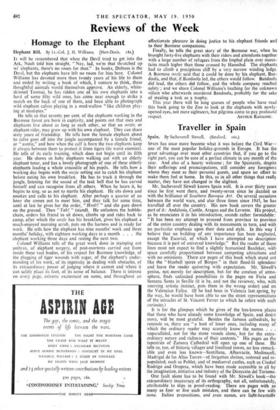Reviews of the Week
Homage to the Elephant
Elephant Bill. By Lt.-Col. J. H. Williams. (Hart-Davis. i8s.) IT will be remembered that when the Devil tried to get into the Ark, Noah told him straight, " Nay, lad, we'm that thrutched up wi' elephants, there's no room for thee," In books, Dulness is the Devil, but the elephants have left no room for him here. Colonel Williams has devoted more than twenty years- of his life to them and ended by writing a book of which, I venture to think, these thoughtful animals would themselves approve. An elderly, white- skinned Toomai, he has ridden one of his own elephants into a herd of some fifty wild ones, has come, near enough to strike a match on the back of one of them, and been able to photograph wild elephant calves playing in a mud-wallow " like children play- ing at mud-pies." He tells us that seventy per cent. of the elephants working in the Burmese forest are born in captivity, and points out that men and elephants live about as long as each other, so that an oozie, or elephant-rider, may grow up with his own elephant. They can share sixty years of friendship. He tells how the female elephant about to calve goes off into the jungle accompanied by a female friend, or " auntie," and how when the calf is born the two elephants keep it always between them to protect it from tigers (its worst enemies). He tells of its early training, which does not begin until its fifth year. He shows us baby elephants walking out with an elderly elephant tutor, and has a lovely photograph of one of these elderly elephants leading a whole crocodile of his pupils. He tells how a working day begins with the oozie setting out to catch his elephant before eating his own breakfast. He has to track it through the jungle, listening for the sound of the teak bell that he has carved himself and can recognise from all others. When he hears it, he begins to sing, so as not to startle his elephant. He sits down and smokes and calls to his elephant. After perhaps a quarter of an hour she comes out to meet him, and they talk for some time, until at last he gives her the order, "Hmit! " and she goes down on the ground. Then " Tah! " (stand). He unfastens the hobble- chain, orders his friend to sit down, climbs up and rides back to camp, after which the oozie has his breakfast, gives his elephant a much-enjoyed morning scrub, puts on the harness and is ready for work. He tells how the elephant has nine months' work and three months' holiday, with eighteen working days in a month . . . the elephant working -three days and resting the next two.
Colonel Williams tells of the great work done in stamping out anthrax, of elephant surgery, of post-mortems carried out from inside these vast bodies, of his respect for Burmese knowledge, of the plugging of tiger wounds with sugar, of the elephant's under- standing of his work, of its ingenuity in dealing with obstacles, of its extraordinary power of judging where it cannot and where it can safely place its foot, of its sense of balance. There is interest on eN ery page, extreme excitement on some, and throughout an
affectionate pleasure in doing justice to his elephant friends and to their Burmese companions.
Finally, he tells the great story of the Burmese war, when he brought forty-five elephants with their riders and attendants together with a large number of refugees from the Imphal plain over moun- tains much higher than those crossed by Hannibal. The elephants had to climb a precipitous cliff by a very' narrow winding ledge. A Burmese oozie said that it could be done by his elephant, Ban- doola, and that, if Bandoola led, the others would follow. Bandoola did lead, the others did- follow, and the whole company reached safety ; and we share Colonel Williams's loathing for the unknown villain who afterwards murdered Bandoola, probably for the sake of stealing a tusk as a trophy.
This year there will be long queues of people who have read this book going to the Zoo to look at the elephants with newly- opened eyes, not mere sightseers, but pilgrims come to pay profound










































 Previous page
Previous page